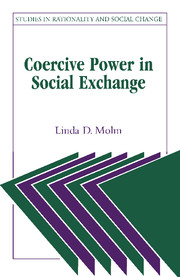
-
Select format
-
- Publisher:
- Cambridge University Press
- Publication date:
- July 2010
- January 1997
- ISBN:
- 9780511570919
- 9780521562904
- 9780521574617
- Dimensions:
- (228 x 152 mm)
- Weight & Pages:
- 0.5kg, 330 Pages
- Dimensions:
- (228 x 152 mm)
- Weight & Pages:
- 0.42kg, 332 Pages
- Subjects:
- Social Theory, Philosophy of Social Science, Sociology
You may already have access via personal or institutional login- Subjects:
- Social Theory, Philosophy of Social Science, Sociology
Book description
This book describes the progression and results of a decade-long program of experimental research on power in social exchange relations. Exchange theorists have traditionally excluded punishment and coercion from the scope of their analyses; but Molm examines whether exchange theory can be expanded to include reward and coercive power. Working within the framework of Emerson's power-dependence theory, but also drawing on the decision theory concepts of strategic action and loss aversion, Molm develops and tests a theory that emphasizes the interdependence of reward and coercive power. Her work shows that they are fundamentally different, not only in their effects on behavior, but also in the structural incentive to use power and the risks of power use. When exchanges are negotiated and secured by the 'shadow of the future,' rather than by binding agreements, dependence both encourages and constrains the use of coercion.
Reviews
"The book represents a model of...disciplined theory construction." Karen S. Cook, American Journal of Sociology
"This fine book offers us strong science and particularly useful knowledge....it will be valuable for graduate students. It should be required reading for anyone interested in social exchange or power." Cecilia L. Ridgeway, Contemporary Sociology
Contents
Metrics
Altmetric attention score
Full text views
Full text views help Loading metrics...
Loading metrics...
* Views captured on Cambridge Core between #date#. This data will be updated every 24 hours.
Usage data cannot currently be displayed.
Accessibility standard: Unknown
Why this information is here
This section outlines the accessibility features of this content - including support for screen readers, full keyboard navigation and high-contrast display options. This may not be relevant for you.
Accessibility Information
Accessibility compliance for the PDF of this book is currently unknown and may be updated in the future.


